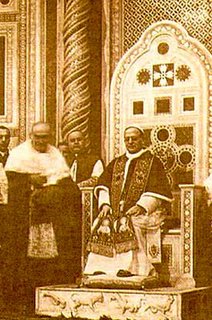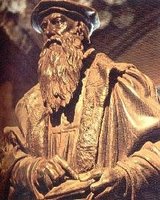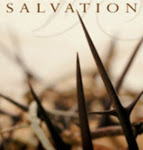
A Journey In Grace
How His Eye Infused That Ray...
I don't usually write personal articles, i.e., ones that deal with my life...my experiences, but we'll make an exception.
I am the child of a Minister.
Reformed...Orthodox...Protestant.
You might imagine that I understood the Doctrines of Grace before I knew my multiplication tables...not so.
How exactly does one know the moment of one's conversion?
I remember understanding as a child...or at least, knowing that Christ's death was real, and that it was the payment for my sin...But it was until some time later that I realised what that truly meant; the ultimate effect of that transaction. I still am not able to pinpoint the "moment" of my conversion, however...
Several years ago, my Family had just been exposed to Reformed Theology; we still had not seen its beauty, not yet tasted the succulent nectar in the centre of the Tulip...(pardon my obvious comparison)
I remember reading Richard P. Belcher, A Journey In Grace, & when I got to the part about John Newton's Amazing Grace, I sat upright and sort-of looked at it twice.
I had never before viewed the words like I did then...I once was lost, but now am found.
In a way (don't go legal on me), it was like a second conversion. A reformation, if you will. I knew the doctrine of Efficacious Grace, but I finally realised the doctrine of Grace as we know it in the Reformed sense.
As I read the words, I knew nothing of hyper, really nothing of Calvin, nothing of supralapsarianism...
I knew nothing, save Christ. This is the ideal which the Reformation embodied...
Solus Christos.
Wednesday, August 16, 2006
Thursday, August 10, 2006

Prayer For The Month
Adapted from Richard Baxter's Puritan Non-Conformist liturgy of 1660:
Eternal, Almighty, and most gracious God: heaven is your throne, and earth is your footstool; holy and reverend is your name; you are praised by the angels of heaven, and in the gathering of your church on earth. Despite our unworthiness, you have invited us through our Mediator, Jesus Christ, to present ourselves and our prayers to you. Receive us graciously. Help us by your Spirit. Let us stand in awe of you. Put your law into our hearts, and write it on our minds. Let your word come to us in power, and help us receive it in love, with attentive, reverent, and teachable minds. Through your word, allow us to taste the flavor of eternal life. Make us fervent in prayer and joyful in praise. Help us serve you this day without distraction, that we may find that a day in your courts is better than a thousand elsewhere, and that it is good for us to come near to God; through Jesus Christ our Lord and Savior. Amen.

Regulative: To worship Him, or self
The Puritan Dilemma
Here is an excerpt from "The Regulative Principle of Reformed Worship in the Puritan Writers and Its Application to the Element of Sung Praise in Worship."
(The less cumbrous title is "The Puritan Principle of Worship.")
“The Puritan principle of Worship was no invention of the Puritans. On the contrary, it is the principle regulative of Worship formulated by Calvin and adopted by all the Reformed Churches, as will appear from a consideration of passages in the writings of Reformed writers and the Reformed creeds. The reformed view of the principle regulative of the external worship of God stands out by way of contrast with the Lutheran view. Lutherans have held that what is not forbidden in the Word of God may be allowed in the Worship of God. Ceremonies in worship are thus regarded as to a large extent indifferent (Adiaphora), i.e. things neither commanded nor forbidden in the Scriptures..."
Calvin refined the regulative principle with a clarity he alone posessed, and applied it with great consistency to the Reformation in Geneva. It is implicit in his celebrated definition of pure and undefiled religion as "confidence in God coupled with serious fear - fear which both includes in it willing reverence, and brings along with it such legitimate worship as is prescribed by the law." (Inst, 1,11,3. Beveridge Trans.).
In his 1559 Latin edition, the text reads "et secum trahit legitimum cultum qualis in Lege praescribitur." (Still very clear on the legitimacy or gravity of the situation, as well as that which is already dictated.)
The French text of 1560, "et tire avec soy un service tel qu'il appartient, et tel que Dieu mesmes i'ordonne en sa Loy." (This text accentuates the Divine origin of acceptable worship.)
Calvin argued that the Regulative principle dispelled all superstion: "In this way, the vain pretext which many employ to clothe their superstition is overthrown. They deem it enough that they have some kind of zeal for religion, how preposterous soever it may be not observing that true religion must be conformable to the will of God as its unerring standard; that he can never deny himself, and is no specter or phantom, to be metamorphosed at each individual's caprice. It is easy to see how superstition, with its false glosses, mocks God, while it tries to please him. Usually fastening merely on things on which he has declared he sets no value, it either contemptuously overlooks or even undisguisedty rejects, the things which he expressly enjoins, or in which we are assured he takes pleasure. Those, therefore, who set up a fictitious worship, merely worship and adore their own delirious fancies; indeed, they would never dare so to trifle with God, had they not previously fashioned him after their own childish conceits...It remains therefore to conclude with Lactantius (Instil. Div. lib. 1,2,6) 'No religion is genuine that is not in accordance with truth.'"(I,IV,3).
How prescient is this thought which Calvin supplies us with: If we desire to hold to our own traditions because we are superstitious, following the Regulative principle is not to our liking.
However, if we follow this principle, namely, doing that in worship which is explicitly commanded; we have no room for our own heresies and inventions, but must give way to His commands.
How venerable are all thoughts gleaned from the Word, and from the mind of God.
Tuesday, August 08, 2006

Ignorance of the Law: no excuse?
Reformed Protestants hold to the line of thought which says that men will die condemned if God does not regenerate their heart through the Holy Spirit. This means, even if they die on some backwater island with no knowledge of Salvation or the Scriptures, they are still condemned.
Armenien brethren would argue (not all, of course - let's be fair) that if they had never heard the gospel, they would be spared, else; how could they be held accountable for something they were never privy to?
Sound intelligent? It does to the Catholics.
The 1538 Questions and Answers on Catholicism And Protestantism [St. Paul: Radio Replies Press] claims to be “Invaluable for the uninformed Catholic - the educated and uneducated lapsed Catholic and prospective Convert.” Lets take a look at question #536.
536. Do you maintain that one is obliged to join your infallible, one, holy, catholic, apostolic, indefectible Church, if he wishes to be saved?
If a man realizes that the Catholic Church is the true Church, he must join it if he wishes to save his soul. That is the normal law. But if he does not realize this obligation, is true to his conscience, even though it be erroneous, and dies repenting of any violations of his conscience, he will get to Heaven. In such a case, it would not have been his fault that he was a non-Catholic and God makes every allowance for good faith.
Elsewhere Rumble and Carty point out, “…[R]emember the conditions of salvation for a Protestant. If he has never suspected his obligation to join the Catholic Church, it is possible for him to be saved. But it is necessary to become a Catholic or be lost if one has the claims of the Catholic Church sufficiently put before him.”
Now Carty and Rumble are saying that if one has been presented with the “claims of the Catholic Church” and rejects them, one may be lost. Rumble and Carty want one to look at the evidence for Roman Catholicism and then make a decision on whether or not to believe it. If one rejects it, one is probably doomed to hell.
So my question is this: If the Catholic church wants more souls in Heaven, wouldn't it just be better to never mention the Catholic church at all? This way, no one would know, & they'd never have the option of declining membership; thus saving their souls.
See...& you thought we should be telling people.
Friday, August 04, 2006

Wanted For Murder: Calvin.....or not
It has long been purported that John Calvin "murdered a man," especially by opponents of Calvin. However, History & - it would seem - the Law, are in favour of John Calvin, not a man named Servetus.
Servetus was a Catholic rhetorician, controversialist and diplomat. He belonged to that suave and cultured type of Catholic that wins to the Church princes and people to education and wealth (or kills them off if anyone disagrees with them). He has been likened by John Morley to Cardinal Newman; although Protestant History & Catholic law finds him a founder of Heresy.
Servetus, opposed the Protestant faith in Geneva (a crime punishable by death at the time), was arrested and thrown into prison. The charge was heresy, and was a legitimate one punishable in any Protestant city (or burgh, as the German Protestant states were called).
The trial lasted from August until September. At first, we find from documents supplied by those who knew Calvin, he would not supply any proof against Servetus, desiring his own testimony of Heresy to find him guilty, although he was at last persuaded to supply proof of guilt by bringing forward the many letters written him by Servetus. The prisoner did not deny the proof, but instead sought to
defend his position, once more - a crime punishable by death, running contrary to Protestant law. Calvin replied at length, and thus did the long - postponed debate take place.
The judges could not revoke the law, although Calvin tried to get a lighter sentence for Servetus.
The next day Servetus was burned alive in the public square.
"I interceded for him," said John Calvin; "I interceded for him - I
wanted him beheaded, not burned."
Was Calvin guilty of MURDER?
If he was, so were the Council of Judges who ruled in favour of Servetus' execution, so were the townspeople who stood by, not only endorsing the Protestant laws in place concerning Heresy, but supporting them by their very citizenship in Geneva, & so were the original lawmakers themselves.
However, most people will never take this into consideration. Calvin pleaded for a lighter sentence on a legally condemned man. F. Lewis Battles once said, “I can usually tell, when people speak of Calvin, whether they know him only by hearsay, have read a few pages, or sampled him anthologically. They have no clue to the wonderful interconnectedness of Calvin’s thought. They ask questions which a fuller reading of the Institutes could have answered.”
Maybe we should think about it a while...

“A man with God is always in the majority.” - John Knox
Tolerance, or Grace?
John Knox: a man who once told the Catholic clergy that they were "gluttons, wantons and licentious revelers, but who yet regularly and meekly partook of the sacrament."
He was not afraid of opposition. In ways, it has been argued (see How The Scots Invented The Modern World) that Knox saved Scotland from being overrun by English forces, as well as instituting the first modern form of democracy.
Mary, Queen of Scots (and a Papist) once remarked, "I fear the prayers of John Knox more than all the assembled armies of Europe." (Could have had something to do with the book he wrote with Mary in mind: The First Blast of the Trumpet Against the Monstrous Regiment of Women)
When it came to mapping out a plan or laying down the law, Knox never hesitated. His plan for a working Theocracy was one of the few which survived for any length of time in the modern day world.
He once said, "The repentance of England requireth two things: First, the expulsion of all dregs of popery and the treading under foot of all glistering beauty of vain ceremonies. Next, no power or liberty must be permitted to any, of what estate, degree or authority they be, either to live without the yoke of discipline by God's word commanded, or to alter one jot in religion which from God's mouth thou hast received. If prince, king or emperor would enterprise to change or disannul the same, that he be the reputed enemy to God, while a prince who erects idolatry must be adjudged to death."
So much for "live & let live," eh?
I think Knox knew something about Christian grace...nothing about tolerance. A lesson we could all learn.

Calvin's sons! Calvin's sons, seize your spiritual guns,
Ammunition you never can need,
Your hearts are the stuff will be powder enough,
And your skulls are a storehouse o' lead,
Calvin's sons! Your skulls are a storehouse o' lead.
Rumble John! rumble John, mount the steps with a groan,
Cry the book is with heresy cramm'd;
Then out wi' your ladle, deal brimstone like aidle,
And roar ev'ry note of the damn'd.
Rumble John! And roar ev'ry note of the damn'd.
Orthodox! orthodox, who believe in John Knox,
Let me sound an alarm to your conscience:
A heretic blast has been blown in the West,
"That what is no sense must be nonsense,"
Orthodox! That what is no sense must be nonsense.
- Robert Burns




